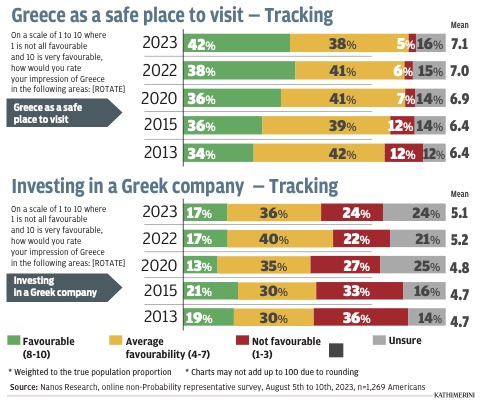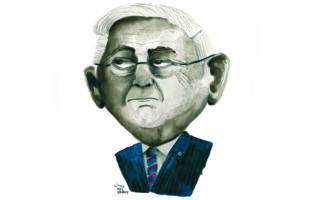The shift in sentiment from skepticism to mutual trust

Greek-American relations are experiencing a “golden age” right now, US analyst and senior fellow for national security and international policy at the Center for American Progress think tank Alan Makovsky told Kathimerini in Washington DC recently, sitting at a Foggy Bottom restaurant looking out at the University of Georgetown dorm named after Jackie Kennedy Onassis.
Having started working at the US State Department in 1983 (he was there until 1994), covering Greece and Cyprus at the Bureau of Intelligence and Research, Makovsky is in a good position to note that relations between Greece and the United States have made a U-turn. With Andreas Papandreou’s socialist government in power in the early 1980s and the Soviet Union expanding its influence, Washington viewed Greece as a “source of great concern and a potential risk.” Ties improved in the 1990s and by the “first decade of the 21st century, the US saw Greece as a not very dynamic but relatively stable ally. It was a country it didn’t need to worry about,” said Makovsky.
Concern returned with the economic crisis and lasted until 2019 when the two countries signed the revised Mutual Defense Cooperation Pact and relations experienced a significant shift, bringing us to the present period. “Greece’s door is open. Prime Minister Kyriakos Mitsotakis wants relations between the two countries to be as close as possible,” said Makovsky.
He also believes that tension between Washington and Turkish President Recep Tayyip Erdogan has contributed to the strengthening of the bond, saying that “Greece’s importance for the US has grown because of problems with Turkey.”
This is a view shared by Michael Rubin, a former Pentagon official and now senior fellow at the Washington-based American Enterprise Institute think tank.
“Turkey’s influence in Washington has waned significantly; even those who officially or unofficially advocate for Turkey are finding it increasingly hard to justify the regime’s actions,” he noted.
As for the marked shift observed in the past four years in how Washington views Greece, Rubin believes that members of the Greek-American lobby, such as Endy Zemenides, executive director of the Hellenic American Leadership Council (HALC), have been instrumental in helping American officials see that US national security interests are better served by having ties with more liberal countries like Greece and Cyprus.
The Trump factor
In many parts of Washington, there is evidence of Donald Trump’s active campaign to become president of the United States again, from hats being sold at street stalls near the Washington Memorial to chocolates with the US flag and his portrait at Dulles Airport’s Duty Free shops. But there are no hats or chocolates for President Joe Biden. So, how would Trump’s re-election affect the “golden age” of Greek-American relations?
Rubin stressed that while it is impossible to predict what kind of foreign policy Trump would pursue if he is elected president of the US again, what really matters is that Congress supports the alliance. “The Greek-American relationship represents a rare instance of bipartisan consensus in Congress. This alliance isn’t going anywhere; it will continue for decades,” he told Kathimerini.
‘Turkey’s influence has waned; even those who officially or unofficially advocate for Turkey are finding it increasingly hard to justify the regime’s actions’
For Makovsky, a Trump re-election would be a tragic turn of events, but would possibly not change much in Greek-American ties. “Trump has Greek-American friends, and this is something that influences him. He likes Erdogan personally, but this did not prevent him from imposing sanctions on Turkey when he was president,” he noted.
In terms of what the United States gains from these close ties with Greece, Makovsky instantly noted the country’s strategic importance, stressing that it brings stability to an unstable region. But it is not just its geography, he added, “it is also its ancient history. I truly believe that,” he told Kathimerini. “The country that gave birth to democracy carries a special weight – so long as it lives up to this historic legacy, of course.”
The historical factor
And history is, indeed, one of the main factors contributing to the positive view of Greece held by Americans, according to a survey by the Nanos research firm in August, whose results were published exclusively by Kathimerini in its Sunday edition.
The survey of 1,269 American citizens over the age of 18 found that 41% of respondents have a very favorable view of Greece and 45% a rather favorable one. This is a significant shift from 2013 when just 27% of Americans asked the same question said they had a very favorable view of the country. In the 2023 poll, 65% also said they are thinking of visiting Greece, against 58% in 2013.
Admiration for Greece’s history and natural attractions has not changed, however, with 78% of respondents both last year and in 2013 saying the country has a fascinating history and 74% both times also saying they regard Greece as being particularly beautiful.
According to Nik Nanos, founder of the Canada-based research company, the Greek brand was and remains very strong in both these areas. “However, even though people say that beauty is important, this does not necessarily translate in how favorably Americans view the country overall,” Nanos told Kathimerini on the sidelines of the 5th Southeastern Europe & East Mediterranean Forum, organized by Kathimerini English Edition in cooperation with Delphi Economic Forum, in Washington, DC last week.
“They need to start seeing the Greek brand not just as a tourism destination, but also as a place to invest and a place to live,” he said. “It’s hard to change this perception, unless you have a comprehensive strategy. When you have their attention because of tourism, that is the opportunity to talk about Greece as an economic partner, a security partner. Greece is more than the sun,” he added.
Even though Greek-American relations at the bilateral level are better than they have been in decades, just 43% of respondents in the Nanos poll had a positive view of Greece as a US partner in NATO. This is, nevertheless, an improvement, noted Nanos, as the rate in 2013 was even lower, at 35%. Moreover, 42% of respondents in 2023 saw Greece as a safe destination, against 34% in 2013.
When it comes to investments, the picture is bleak but with a silver lining: The survey found that just 17% of respondents in 2023 took a very favorable view of investing in a Greek firm, down from 19% in 2013; however, those with an unfavorable view of such a prospect dropped in 2023 to 24% from 36% a decade earlier.
“Many people are still uncertain about Greece,” said Nanos, stressing the need to change these attitudes.
“Greece has a chance to present itself as a destination similar to California, say: a place that is not just beautiful to visit, but which also has a strong tech sector and an agricultural sector. Greece needs to diversify its brand beyond its basic assets,” he explained.
As far as strategy is concerned, Nanos believes that it is important to remind the American public of what the American government already knows. “With everything that is going on right now in the Eastern Mediterranean, it is crucial to Greece’s reputation that Americans are reminded that the country is not just a NATO ally, but a very stable and trustworthy NATO ally,” he stressed.






